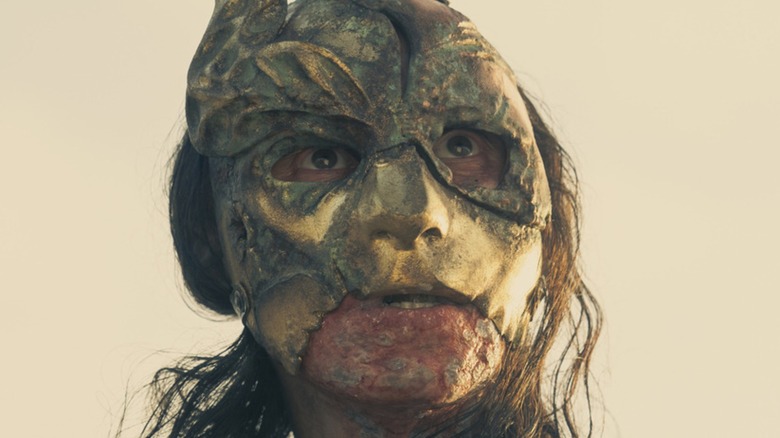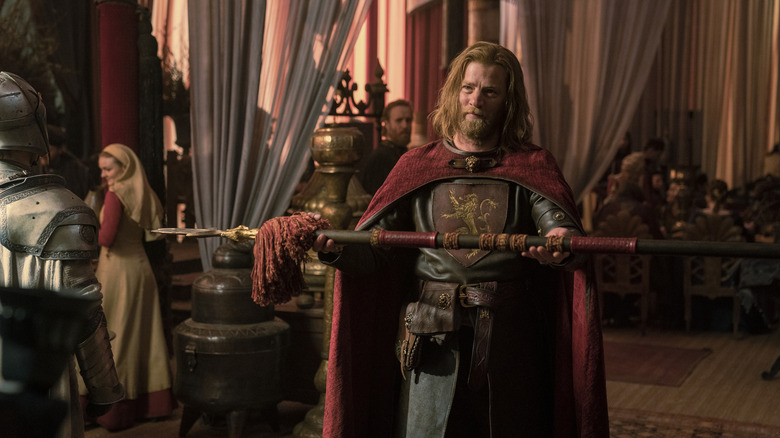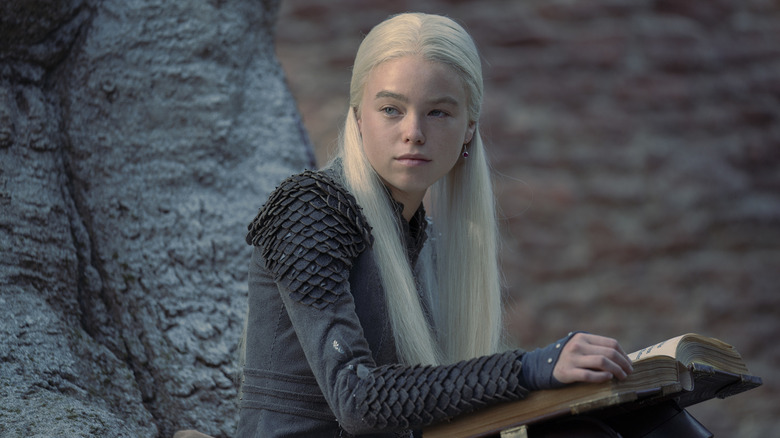The White Hart From House Of The Dragon Episode 3 Means More Than You Think
Contains spoilers for "House of the Dragon" Season 1, Episode 3
Prophecy plays a big part in both "House of the Dragon" and "Game of Thrones." In the latter, the Red Priestess, Melisandre (Carice van Houten), often gleans future events from the Lord of Light by reading portents cast in fire. She even shares these visions with Stannis Baratheon (Stephen Dillane), who believes in her so much that he is willing to sacrifice his own daughter in order to receive a divine boon. After things end poorly for Stannis, Melisandre believes that her "promised prince" is in fact Jon Snow (Kit Harington).
"House of the Dragon" reveals that the Targaryen dynasty actually knows of the coming of "the Long Night" and the Night King. This is highlighted when King Viserys (Paddy Considine) tells his daughter and heir Rhaenyra (Milly Alcock) of the prophecy and how the world will only survive if a Targaryen sits upon the Iron Throne. He isn't wrong, considering what fans of "Game of Thrones" have already seen. However, Episode 3 of "House of the Dragon" features yet another assumed portent and supposed sign from the gods in the form of white harts, but what could the stags mean for the future of the series?
White harts are considered a sign of royalty, and their appearances are messages from the gods
To celebrate the second birthday of Viserys' child with Alicent (Emily Carey), Aegon, the king decides to engage in a massive hunt in the Kingswood, bringing his entire family with him, including Rhaenyra. Upon arrival at camp, Otto Hightower (Rhys Ifans) informs Viserys that a white hart has been spotted and is currently being tracked down by skilled hunters. Otto notes that the white hart used to be the sign of royalty before the ascent of the Targaryens and their obsession with dragons and reiterates that the appearance of a white hart is a sign from the gods and that they surely favor Aegon to rule the realm, considering the hunt is in his honor.
Eventually, the king's huntsmen corner a great stag — though not the white one the king was promised — and Viserys is brought to the location in order to strike the killing blow. Viserys' first blow does not kill the hart, and he is told to deliver a second strike in order to usher the animal from its mortal coil.
This is not the first great hunt for a white hart with an unfortunate ending — Robert Baratheon (Mark Addy) actually hunts one in "Game of Thrones," though he finds the beast already killed and devoured by wolves before deciding to hunt the giant boar that eventually ends up killing him.
If white harts are considered a sign, the gods must favor Rhaenyra to take the Iron Throne
Far from Viserys' bumbling attempt to kill the mundane hart, Rhaenyra and Criston Cole (Fabien Frankel) rest on an overlook that towers above the hunting camp. The previous night had seen the two sitting alone in the Kingswood when they are attacked by a boar, but luckily, Rhaenyra is able to hold her own against the beast, which results in her being coated in blood after the boar is felled. A white hart approaches Rhaenyra and Criston as they gaze upon the landscape, and Criston goes to draw his blade in defense. However, Rhaenyra gives him the command to sheath his weapon, and the white hart almost looks at her approvingly before turning away.
According to A Wiki of Ice and Fire, a white hart is considered magical and rare, which must lead to the belief that they are signs from the gods. Otto Hightower may not have been wrong in assuming the appearance of a white hart is a potent sign, but considering the two outcomes involving the great stags, one might assume that the gods favor Rhaenyra over Aegon since Viserys' interaction with the animal is bloody and messy, while Rhaenyra's is peaceful and serene. This could be a sign, as Otto suggested, but it is doubtful that it will be interpreted correctly by the citizens of Westeros. At least the gods have made their will known to those willing to listen.


